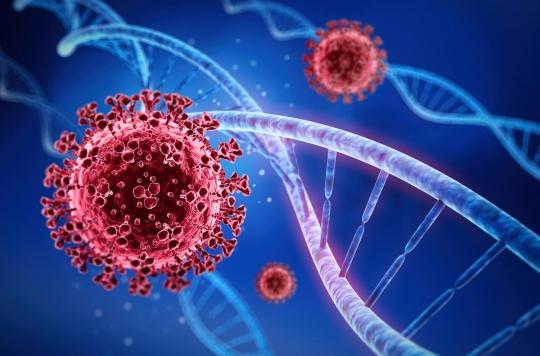60% of the population of South Asian origin and 15% of people of European descent would be carriers of a gene which would double the risk of respiratory failure.

- Called LZTFL1, this gene is present in 60% of South Asians and 15% of Europeans. It would cause a doubly increased risk of respiratory failure in the event of infection with Covid-19.
- This discovery could partly explain the excess mortality observed in certain British communities and the impact of Covid-19 in the Indian subcontinent.
- Because this gene does not affect the immune system, people with it respond just as well as others to vaccines.
Is the risk of developing a severe form of Covid-19 and dying from it a matter of genetics? This is according to researchers from the Radcliffe Department of Medicine at the University of Oxford, England.
In a study published in the journal Nature Genetics, they establish that 60% of the population of South Asian origin and 15% of Europeans carry a genetic signal at high risk of developing respiratory failure. Called LZTFL1, it could partly explain the excess mortality observed in certain British communities and the impact of Covid-19 in the Indian subcontinent.
A genetic signal that affects lung cells
Last year, a study published in the New England Journal of Medicine revealed that a stretch of DNA on chromosome 3 doubled the risk of death from Covid-19 in adults under 65. However, scientists did not know how this genetic signal worked to increase the risk, or the exact genetic change that was responsible for it.
Using state-of-the-art technology, the Oxford researchers managed to determine which gene was at the origin of this over-risk of severe form. “We found that the increased risk is not due to a difference in the gene coding for a protein, but a difference in the DNA that flips a switch to activate a gene. It is much more difficult to detect the gene which is affected by this type of indirect switching effect”explains Professor Jim Hughes, who coordinated the work.
Using an artificial intelligence algorithm, the researchers analyzed genetic data from hundreds of cell types from all parts of the body, to show that the genetic signal is likely to affect lung cells. They were also able, using advanced technology they created, to pinpoint the specific gene that causes the increased risk of developing a severe form of Covid-19.
“Surprisingly, while several other genes were suspected, the data showed that a relatively understudied gene called LZTFL1 was responsible for the effect”says Dr. Hughes.
60% of people of South Asian descent are carriers
According to the researchers, this gene probably prevents the cells that line the airways and lungs from responding properly to the virus. “The genetic factor we discovered explains why some people get very seriously ill after coronavirus infection. It shows that how the lung responds to infection is key. This is important because most treatments have focused about altering the way the immune system responds to the virus,” details Professor James Davies, co-director of the study.
According to the authors, 60% of people of South Asian descent carried this high-risk version of the gene, compared to 15% of people of European descent. This partly explains the higher mortality and hospitalization rates in the first group. The study also found that only 2% of people of Afro-Caribbean descent carried the high-risk genotype.
No impairment of vaccine efficacy
However, the researchers found that this genetic factor did not affect the immune system. People who are carriers should therefore respond normally to vaccines.
They now hope that drugs and other therapies can target the pathway that prevents the lung lining from turning into less specialized cells, which would pave the way for new treatments tailored to those most likely to develop severe symptoms.

.















